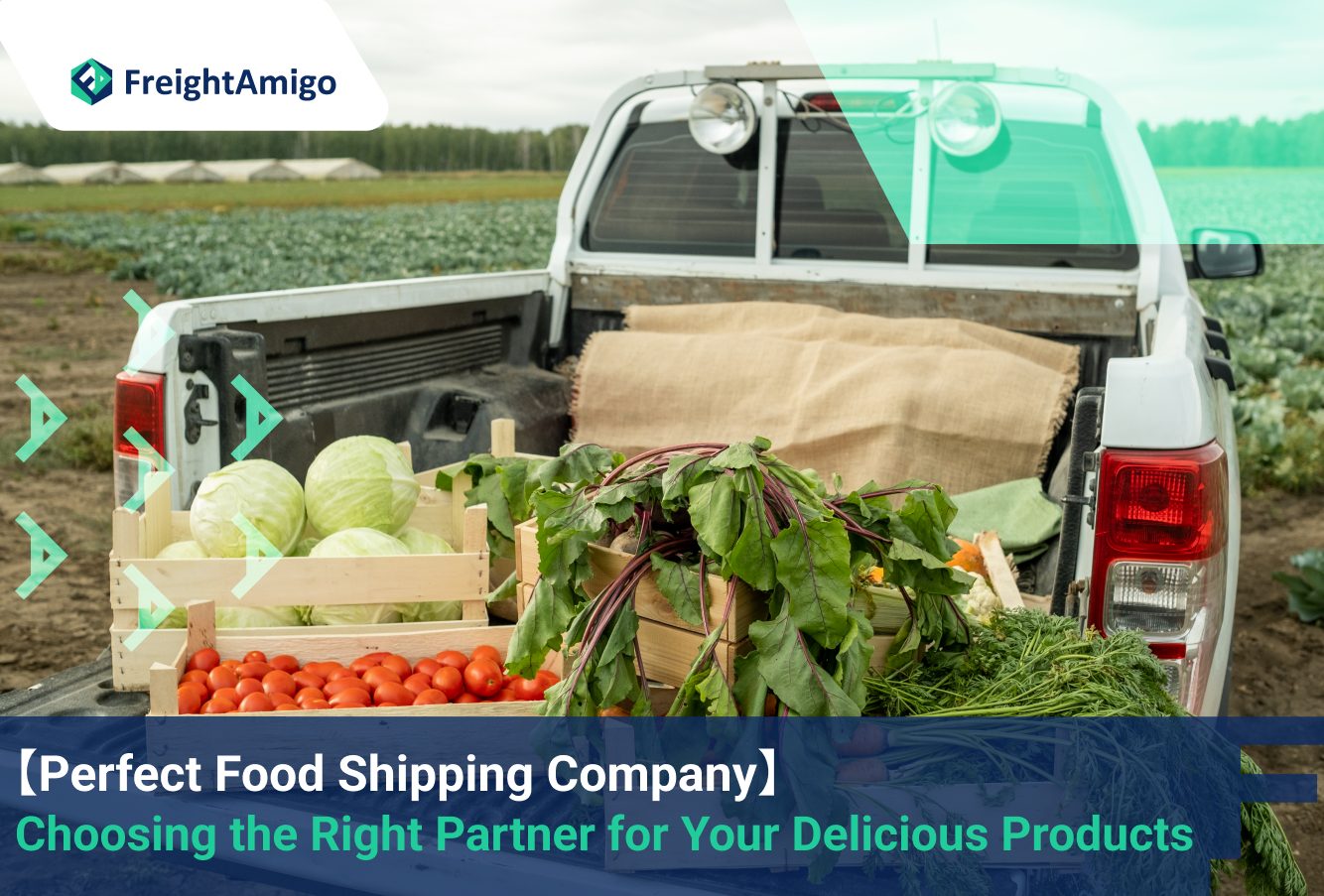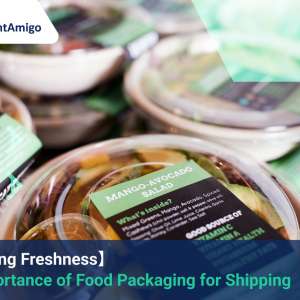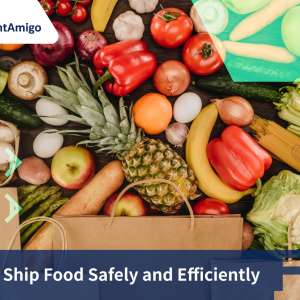When it comes to the success of your food and beverage business, choosing the right food shipping company is crucial. The way your products are handled during transportation can greatly impact their quality and freshness upon arrival. Whether you are a small local bakery or a large-scale food manufacturer, finding a reliable partner for shipping your delicious products is essential.
First and foremost, selecting a reputable food shipping company ensures that your goods are handled with care and adhere to strict food safety regulations. This is especially important if you deal with perishable items that require specific temperature control, such as dairy products, fresh produce, or seafood. A reliable partner will have the proper equipment and expertise to maintain the optimal conditions throughout the entire shipping process.
Another key aspect is the timeliness of deliveries. Customers expect their orders to arrive on time, and delays can result in disappointment and loss of trust. By choosing a food shipping company known for its punctuality and efficient logistics, you can ensure that your customers receive their products when expected. This not only helps in building a loyal customer base but also enhances your reputation as a reliable supplier.
Latest update on 5 February, 2024 by Aiden Ng– Marketing Analyst at FreightAmigo
Want to compare the best Express, Air Freight, Sea Freight, Rail Freight & Trucking rates so as to have better control on cost?
Factors to Consider When Choosing a Food Shipping Company
Before making a decision, it is important to consider several factors that will help you choose the right food shipping company for your business. The first factor to consider is the company’s experience and expertise in handling food products. Look for a company that has a proven track record in the industry and has demonstrated success in transporting similar items to yours. This ensures that they understand the specific requirements of your products and can handle them with care.
Next, consider the company’s range of services. Do they offer different shipping methods and options? Can they accommodate your specific needs, such as temperature-controlled shipping or specialized packaging? It is important to choose a food shipping company that can provide customized solutions to meet your unique requirements. This flexibility will allow you to adapt to changing market demands and expand your business in the future.
Another crucial factor to consider is the company’s reputation and customer reviews. Take the time to research and read feedback from other businesses that have used their services. This will give you valuable insights into their reliability, customer service, and overall satisfaction. Additionally, consider the company’s network and coverage area. If you plan to expand your business to new regions or offer nationwide shipping, it is important to choose a company that can support your growth plans.
Types of Food Shipping Methods Available
When it comes to shipping food products, there are several methods available, each with its own advantages and limitations. Understanding these methods will help you make an informed decision when choosing a food shipping company. Let’s explore the most common types of food shipping methods:
- Refrigerated Trucks: Refrigerated trucks, also known as reefers, are commonly used for transporting large quantities of perishable goods over long distances. These trucks are equipped with temperature-controlled compartments that ensure the products remain fresh and safe during transit. Refrigerated trucks offer flexibility in terms of the volume of goods they can transport and are suitable for businesses that require bulk shipments.
- Air Freight: Air freight is a fast and efficient method for shipping food products, especially for businesses that deal with time-sensitive perishables. It allows for quick transportation over long distances and ensures minimal handling, reducing the risk of damage or spoilage. However, air freight can be more expensive compared to other methods, and there may be restrictions on certain types of food products that can be shipped by air.
- Express Delivery Services: Express delivery services, such as courier companies, offer fast and reliable shipping options for smaller food businesses. These services are known for their quick delivery times, often within a day or two. While they may not be suitable for large-scale shipments, express delivery services are ideal for businesses that need to send smaller quantities of products to local or regional customers.
Pros and Cons of Each Shipping Method
Each food shipping method has its own pros and cons, which should be carefully considered when choosing the right partner for your business. Let’s explore the advantages and limitations of each method:
Refrigerated Trucks:
Pros:
- Suitable for large-scale shipments
- Can transport a wide range of perishable products
- Offer temperature control for optimal product freshness
Cons:
- Limited to ground transportation
- Longer delivery times for long-distance shipments
- Higher costs compared to other methods for smaller businesses
Air Freight:
Pros:
- Fastest method for long-distance shipments
- Minimal handling reduces the risk of product damage
- Suitable for time-sensitive perishables
Cons:
- Higher costs compared to other methods
- Restrictions on certain types of food products
- Limited capacity for bulk shipments
Express Delivery Services:
Pros:
- Quick and reliable delivery for smaller quantities of products
- Ideal for local and regional shipments
- Cost-effective for small businesses
Cons:
- Limited capacity for large-scale shipments
- Not suitable for long-distance or international shipping
- Less flexibility in terms of temperature control
Criteria for Choosing a Logistics Partner for the Food and Beverage Industry
Choosing the right logistics partner for the food and beverage industry requires careful evaluation based on specific criteria. Here are some key factors to consider:
- Food Safety Standards: The logistics partner should have a thorough understanding of food safety regulations and compliance. They should have proper certifications and protocols in place to ensure the safe handling and transportation of food products.
- Temperature Control Expertise: If your products require specific temperature control, ensure that the logistics partner has the necessary equipment, technology, and expertise to maintain the required temperature throughout the shipping process.
- Efficient Supply Chain Management: A reliable logistics partner should have a well-established supply chain management system in place. This includes real-time tracking, inventory management, and effective communication to provide visibility and transparency throughout the entire supply chain.
- Customer Service: Consider the responsiveness and reliability of the logistics partner’s customer service. They should be readily available to address any concerns or issues that may arise during the shipping process.
- Scalability and Flexibility: Choose a logistics partner that can accommodate your business’s growth and evolving needs. They should have the capacity to handle increasing volumes, expand their coverage area, and provide customized solutions as your business expands.
The Importance of Real-Time Tracking Systems for Visibility Throughout the Supply Chain
In the food shipping industry, real-time tracking systems play a crucial role in providing visibility and transparency throughout the supply chain. These systems allow businesses to monitor the location, temperature, and condition of their products at any given time. Here’s why real-time tracking is essential:
- Quality Assurance: Real-time tracking systems provide assurance that your products are being handled properly and are maintaining the required temperature throughout the shipping process. This helps ensure that your customers receive fresh and safe products.
- Timely Decision Making: With real-time tracking, businesses can quickly identify any issues or delays in the shipping process. This enables timely decision making and allows for proactive measures to be taken, such as rerouting shipments or addressing any temperature fluctuations.
- Customer Satisfaction: Real-time tracking systems provide accurate and up-to-date information about the status of shipments. This allows businesses to provide customers with real-time updates on their orders, enhancing customer satisfaction and building trust.
- Supply Chain Optimization: Real-time tracking systems enable businesses to identify bottlenecks or inefficiencies in their supply chain. By analyzing the data collected, businesses can make informed decisions to optimize their operations, reduce costs, and improve overall efficiency.
Conclusion: Finding the Perfect Food Shipping Company for Your Unique Needs
Choosing the right food shipping company is a vital decision for any food and beverage business. By considering factors such as experience, services, reputation, and customer reviews, you can find a reliable partner that meets your unique requirements. Understanding the different types of shipping methods, their pros and cons, and the significance of cold shipping will further help you make an informed decision. Additionally, selecting a logistics partner with real-time tracking systems and expertise in temperature control ensures visibility and quality throughout the supply chain. With the right food shipping company by your side, you can confidently deliver your delicious products to satisfied customers.
There are different options for cargo transportation. If you want to choose the most convenient and suitable solution, it is best to have the full support of logistics experts! If you are planning to ship goods overseas, please go to the FreightAmigo page for inquiries.
Read More:
How to Ship Food Safely and Efficiently
【Delivering Freshness】 The Importance of Food Packaging for Shipping
【From Farm to Fork】 A Beginner’s Guide to Food and Beverage Shipping
【The Evolution of Cold Chain Technologies】 Ensuring Optimal Temperature Control in Shipping
If you have any inquiries on logistics/supply chain, feel free to contact FreightAmigo now:
Chat with us online | Hotline: +852 28121686 | WhatsApp: +852 27467829









































